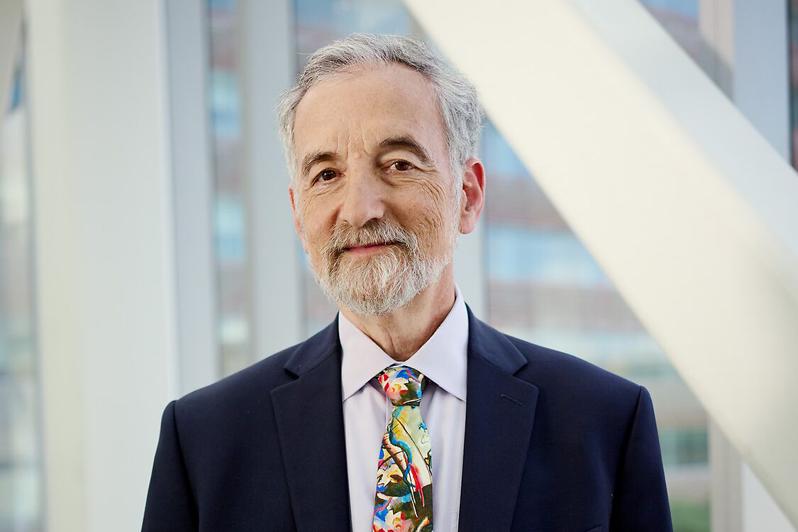Rewriting Healthcare by Jeffrey Samet, MD, MA, MPH, Primary Care Physician
For the past 40 years, Dr. Jeffrey Samet has worked with patients with substance use disorder (SUD) in the primary care setting. Well-known as an innovator and researcher in SUD treatment, Dr. Samet works tirelessly to bring compassion and understanding to patients with SUD and opioid use disorder (OUD).
“At BMC, there is a lot of openness around how you take care of patients who are struggling with alcohol and drugs,” Dr. Samet says. “Rewriting healthcare is embracing the needs of patients — their medical needs, their psychological needs, even their social needs. We won’t get it right every time, but we’re moving in that direction.”
Read on to learn how Dr. Samet and BMC are rewriting healthcare for all patients with substance use disorders.
How did you come to work at BMC?
My interest in treating patients with alcohol and drug problems began in my medical school years. And part of my motivation for coming to Boston Medical Center in the early ’80s, when it was Boston City Hospital, was to train in internal medicine in a public hospital. At that time, there was no understanding that substance use disorder was a brain disease and little or no understanding of the genetic dimensions to it all. And now, 35 years later, we are the leader in addiction medicine and are setting a standard for how to take care of these patients.
What’s unique about the way SUD is handled at BMC?
We have to destigmatize SUD, to help people realize that it is a medical problem, just like coronary artery disease and asthma, and it can be treated. Part of what we do at BMC is motivating patients to realize things could be better and that help, such as medications, is available.
We also understand that there’s a whole spectrum of patients with SUD. Some of our patients are in long-term recovery. Some are actively using and have no interest in recovery. And some people are ambivalent, and we try to motivate them. You first make sure they can stay safe, because fentanyl is out there and poses a risk to their lives. You can’t push recovery — you just let them know the pros and the cons, and they have to make up their mind. But even if they’re not ready to quit yet, you need to keep them alive. That’s the goal — to keep people safe.
Our team includes people who focus on harm reduction. They have great experience and insights, and many of them also have lived experience. This is particularly helpful in talking to those individuals who are ambivalent. They know what it’s like to be dealing with a substance use disorder, and they have compassion for that. And they understand how to engage people who aren’t ready to quit but don’t want to die.
How is BMC pushing the boundaries of SUD care?
In 2002, buprenorphine became legal to treat OUD in the outpatient primary care setting. We saw that as an opportunity to create a team-based clinic, the Office Based Addiction Treatment (OBAT) Program. This year is the 20th anniversary of OBAT, and we have over 800 patients in primary care at BMC who are receiving medications for their addiction. And perhaps more importantly, we’ve trained people throughout the state and around the country about caring for patients with OUD. The model for treating patients in our OBAT clinic has been adopted in many clinics across the country and is often referred to as the “Massachusetts model.”
Another innovation that has taken hold at BMC in the past seven or eight years is the Addiction Consult Service. This program allows hospitalized patients to get care for their addictions, which wasn’t always the case before. That program has taken off, and it’s now growing all around the country. It’s been gratifying to see it take off in smaller hospitals as well as the academic university hospitals.
BMC also led a large National Institutes of Health grant, the HEALing Communities Study. One of the innovations of this big study is that we can tackle the different problems that different communities have. For example, Lawrence, Massachusetts, is different from a town on Cape Cod. And as part of this grant, the communities themselves see data about their community, see who’s involved, and see what resources they have. Then they can decide what resources are required to address their particular needs, and funds are made available to help them put those activities in place.
This approach works because the community knows their deficiencies and strengths best. And if you can get different voices from the community at one table, then they can come up with a plan together.
What is BMC to you?
BMC is a top-of-the-line leader in many dimensions of research, including addiction. BMC is not afraid of taking care of patients who might not receive that same care in other institutions.
How is BMC rewriting healthcare?
BMC is rewriting healthcare by creating settings where patients can get good, appropriate care and where providers, doctors, nurses, social workers, and others can feel good about the care they’re delivering. We’ve been rewriting healthcare for a long time, but we’re getting better and better at it.
 en
en 

 Français
Français Deutsch
Deutsch Italiano
Italiano Español
Español Tiếng Việt
Tiếng Việt Kreyol ayisyen
Kreyol ayisyen